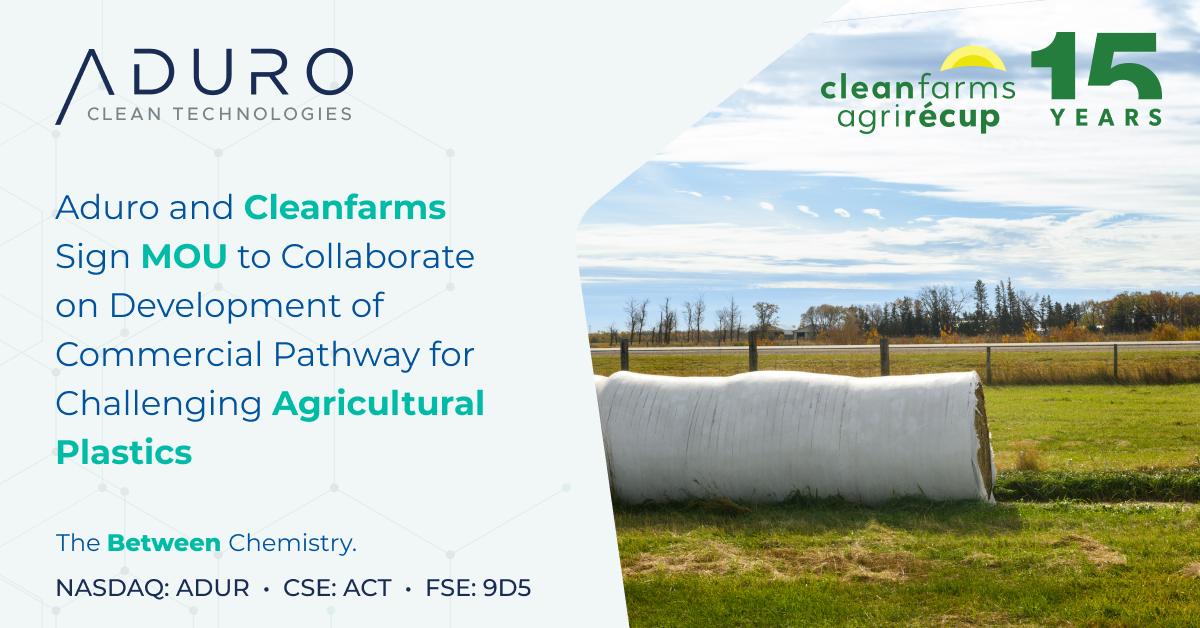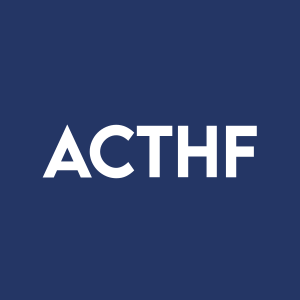Aduro Clean Technologies and Cleanfarms Sign Memorandum of Understanding to Collaborate on Development of Commercial Pathway for Challenging Agricultural Plastics
Rhea-AI Summary
Positive
- Partnership with Cleanfarms provides access to extensive collection network of over 2,000 sites
- Addresses large market opportunity with 62,000 tonnes of agricultural plastic waste in Canada alone
- Multi-phase approach allows for systematic validation of technology and commercial viability
- Cleanfarms' proven track record with 87% recovery rate demonstrates operational effectiveness
Negative
- Early-stage development with no guaranteed commercial success
- Technology still requires validation through multiple testing phases
- Project timeline and costs for full commercial implementation not specified
Insights
Aduro partners with Cleanfarms to test its recycling technology on agricultural plastics waste, establishing potential commercialization pathway in underserved market.
Aduro Clean Technologies has formed a strategic partnership with Cleanfarms to evaluate its Hydrochemolytic™ Technology (HCT) for recycling agricultural plastic waste - a significant market opportunity with
This collaboration addresses a critical environmental challenge: agricultural plastics like silage film, bale wrap, and grain bags that are currently difficult to recycle due to contamination with soil and organic matter. Most of these materials end up landfilled, burned, or stockpiled rather than recycled through conventional methods.
The partnership follows a methodical, risk-mitigating approach with three distinct phases:
- Phase A: Laboratory testing using real-world contaminated agricultural plastic samples
- Phase B: Scale-up testing in Aduro's Next Generation Pilot plant with techno-economic modeling
- Phase C: Potential integration with Aduro's planned Demonstration Plant (non-binding)
Cleanfarms brings valuable assets to this collaboration, including established extended producer responsibility frameworks, relationships with over 200 member companies, and a network of 2,000+ collection sites. Their operational capabilities are demonstrated by an impressive
For Aduro, this partnership addresses a critical development need: securing representative, scalable feedstock streams for testing and validation. The focus on heavily contaminated materials plays to the claimed strengths of their technology, potentially opening access to a market segment currently underserved by conventional recycling approaches.
While this represents positive progress in technology validation and market positioning, the non-binding nature of Phase C indicates that commercial implementation remains contingent on successful technical and economic validation in earlier phases.
Multi-phase collaboration to assess the technical and commercial feasibility of Aduro’s Hydrochemolytic™ Technology as a potential commercial-scale solution for chemical recycling of on-farm plastic waste
LONDON, Ontario, May 08, 2025 (GLOBE NEWSWIRE) -- Aduro Clean Technologies Inc. (“Aduro” or the “Company”) (Nasdaq: ADUR) (CSE: ACT) (FSE: 9D5), a clean technology company using the power of chemistry to transform lower-value feedstocks, like waste plastics, heavy bitumen, and renewable oils, into resources for the 21st century, today announced the signing of a Memorandum of Understanding (“MOU”) with Cleanfarms Inc. (“Cleanfarms”), which is known as AgriRÉCUP in Quebec. Cleanfarms is a Canadian Producer Responsibility Organization (“PRO”) focused on agricultural waste management. The MOU outlines a multi-phase collaboration to evaluate the technical and economic feasibility of using Aduro’s Hydrochemolytic™ Technology (“HCT”) as a potential commercial-scale solution for the chemical recycling of on-farm plastic waste that is currently difficult to manage through conventional methods.
Agricultural plastics such as silage film, bale wrap, grain bags, netting, and twine are essential in modern farming operations but can present recycling challenges due to high levels of contamination and limited viable end-of-life options. In Canada, the agricultural sector generates an estimated 62,000 tonnes of plastic annually, much of which is landfilled, burned, or stockpiled. Globally, agricultural value chains used approximately 12.5 million tonnes of plastic products in plant and animal production in 2019, according to the Food and Agriculture Organization of the United Nations. Cleanfarms operates within Extended Producer Responsibility frameworks in several provinces and works with more than 200 member companies and a network of over 2,000 collection sites to ensure these materials are responsibly managed. In 2023 Cleanfarms achieved an
“Our goal is to develop a commercial pathway for difficult-to-recycle agriculture waste, waste streams that are strong candidates for Aduro’s HCT and are currently overlooked by conventional technologies,” said Ofer Vicus, Chief Executive Officer at Aduro. “Cleanfarms brings deep knowledge of the agricultural waste landscape and a national supply chain that can support our evaluation of HCT on real-world farm plastic materials. Together, we’re building the foundation for a solution to reduce landfilling and open new value streams.”
The collaboration will progress through three stage-gated phases designed to evaluate the technical and economic feasibility of using the Hydrochemolytic™ Technology to process post-consumer agricultural plastics. Phases A and B are binding, while Phase C is non-binding and contingent on the successful outcomes of the earlier phases.
Phase A: Laboratory Feasibility Trails - Aduro will conduct laboratory-scale testing on representative agricultural plastic waste samples provided by Cleanfarms. These samples are expected to include mixed silage film, bale wrap, grain bags, bale netting, and polypropylene twine in their collected, unprocessed form to reflect real-world levels of contamination from soil, organic matter, and moisture. Aduro will assess sorting and pre-treatment requirements and conduct batch Hydrochemolytic™ processing trials to determine contaminant tolerance, conversion efficiency, and product composition. The results will help define preprocessing requirements and feedstock suitability for scale-up.
Phase B: Scale-Up and Process Modeling – Cleanfarms will supply larger volumes of field-grade agricultural plastics for processing in Aduro’s Next Generation Pilot plant. Aduro will evaluate system performance under continuous flow, investigate preprocessing needs, and assess operational stability. This phase will also include the development of a preliminary techno-economic and eco-efficiency model, incorporating key processing parameters, product yields, environmental impact, and potential market value of outputs.
Phase C: Demonstration Plant Integration – Contingent on the successful completion of Phases A and B, agricultural plastics may be evaluated as a potential feedstock for inclusion in Aduro’s planned Demonstration Plant. While the project is in early-stage development, securing representative, scalable feedstock streams is a critical component. This phase would support validation of continuous operation with agricultural plastics and further refine the techno-economic model, leveraging Cleanfarms’ experience in logistics and national collection programs to inform broader commercial deployment strategies.
“This collaboration reflects our ongoing commitment to advance solutions for all agricultural plastics,” said Barry Friesen, Executive Director at Cleanfarms. “Our members seek scalable technologies to recover materials that currently have limited or no recycling options. Evaluating chemical recycling is a vital step in building a more complete circular economy for Canadian agriculture. We’re encouraged by Aduro’s progress to date and eager to learn more about its potential applicability for agriculture.”
Cleanfarms (AgriRÉCUP) is an agricultural industry stewardship organization that contributes to a healthier environment and a sustainable future by recovering and recycling agricultural and related industry plastics, packaging and products. It is funded by its members in the crop protection, seed, fertilizer, animal health medication, peat moss, animal bedding, feed, ag plastics, and maple tubing industries. Its team members are located in British Columbia, Alberta, Saskatchewan, Manitoba, Ontario, Quebec and the Maritimes.
About Aduro Clean Technologies
Aduro Clean Technologies is a developer of patented water-based technologies to chemically recycle waste plastics; convert heavy crude and bitumen into lighter, more valuable oil; and transform renewable oils into higher-value fuels or renewable chemicals. The Company’s Hydrochemolytic™ Technology relies on water as a critical agent in a chemistry platform that operates at relatively low temperatures and cost, a game-changing approach that converts low-value feedstocks into resources for the 21st century.
For further information, please contact:
Abe Dyck, Head of Business Development and Investor Relations
ir@adurocleantech.com
+1 226 784 8889
Margot Beverley, Director, Communications, Cleanfarms
beverleym@cleanfarms.ca
+ 1 647 557 1801
KCSA Strategic Communications
Jack Perkins, Senior Vice President
aduro@kcsa.com
Forward-Looking Statements
This news release contains forward-looking statements. All statements, other than statements of historical fact that address activities, events, or developments that the Company believes, expects, or anticipates will or may occur in the future, are forward-looking statements. The forward-looking statements reflect management’s current expectations based on information currently available and are subject to a number of risks and uncertainties that may cause actual outcomes to differ materially from those discussed in such forward-looking statements. The forward-looking statements in this release include, but are not limited to, the Company’s collaboration with Cleanfarms to evaluate the application of HCT for recycling agricultural plastic waste; the successful execution and outcomes of the three-phase collaboration framework, including laboratory feasibility testing, scale-up trials in the R2 reactor, and integration into the pilot-scale platform; the potential for HCT to provide a viable commercial-scale solution for contaminated or hard-to-recycle agricultural plastics; the development of techno-economic and eco-efficiency models; the exploration of provincial or federal funding opportunities to support the initiative; the intention to use the results of the collaboration to inform broader deployment strategies across Canada and internationally; the potential to reduce landfilling and open new value streams through the application of HCT; the ability of Cleanfarms’ national supply chain and logistics expertise to support real-world evaluation and commercial deployment; the inclusion of agricultural plastics as a feedstock in Aduro’s planned Demonstration Plant; and the broader goal of building a more complete circular economy for Canadian agriculture. Although the Company believes that the assumptions underlying these statements are reasonable, forward-looking statements are not guarantees of future performance and involve known and unknown risks and uncertainties. These include, but are not limited to, challenges in securing consistent and scalable volumes of agricultural plastic waste, including variability in contamination levels and regional collection logistics; the uncertainties regarding the performance of the Company’s HCT when applied to highly contaminated, mixed-polymer agricultural plastics under real-world conditions, such as potential limitations in contaminant tolerance, conversion efficiency, or product quality; technical and engineering challenges may arise in scaling the HCT process from laboratory to pilot and demonstration scale, including risks related to continuous flow operation, system stability, and the integration of preprocessing steps; the development and commissioning of the Company’s pilot or demonstration plant may face delays, cost overruns, or technical setbacks that could impact the timeline or feasibility of commercial deployment; there may be inaccuracies or limitations in the development of techno-economic and eco-efficiency models, including assumptions about processing costs, product yields, environmental benefits, and market value of outputs; the availability, timing, or sufficiency of provincial or federal funding to support the initiative is uncertain, as are potential changes in regulatory frameworks that could affect project viability or compliance; the market risks including shifts in demand for recycled hydrocarbons, changes in agricultural plastic usage patterns, and evolving policy or producer responsibility regulations that could influence the commercial attractiveness or strategic direction of the initiative; and the risks associated with translating pilot-scale results into broader commercial deployment strategies, including logistical complexities, stakeholder engagement, and alignment with Cleanfarms’ national collection infrastructure. The Company expressly disclaims any intention or obligation to update or revise any forward-looking statements whether as a result of new information, future events, or otherwise, except as required by applicable law.

A photo accompanying this announcement is available at https://www.globenewswire.com/NewsRoom/AttachmentNg/3669db2a-ad5a-4b5c-b9fc-e7bc9853a945








